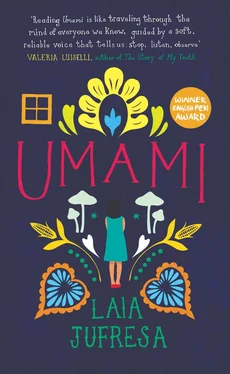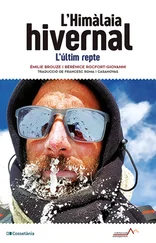When the house half collapsed in 1985 and we ended up having to write off the whole building, move to Morelia for a year, and come up with a new ‘life project’, it occurred to me to dig out the sketches I’d made during my period of convalescence and convince my wife that we should throw ourselves into converting what was left of the house into something else entirely: a set of houses we could rent. And that’s when we discovered that the inordinate quantities of painkillers I’d consumed during my recovery had led me to somewhat overestimate my artistic ability. But Noelia, who spent the whole of eighty-six in a private clinic we’d set up in her cousin’s house, seeing patients who were all, in one way or another, relations of hers, said, ‘Do what you like, love, just get cracking so we can go back to Mexico City.’
‘Not true! I also always thought your drawings were good.’
‘By which you mean bad.’
‘It doesn’t work both ways, smarty pants.’
*
I feel it is my duty to point out, in case I die and someone finds this, that Harvard has publicly repudiated the little map of the tongue Nakahara sent me. Now, if you think about it, anyone with two brain cells and a drop of lemon on the tip of the tongue (supposedly the area that only distinguishes sweetness) could have exposed it sooner, but this didn’t occur to those of us who took the map as a given (basically because it came from Harvard; we smarty pants are suckers for the smartest smarty pants). Anyway, it turned out to be a load of baloney. But it was a good map; at least, it served us well as a foundation for our plans for the mews, with an added dose of artistic license.
*
The houses in Belldrop Mews are arranged as follows:

And they’re occupied as follows:
Bitter House: Marina. A young painter who doesn’t eat or indeed paint much, but invents colors. For example: fusciaranth is the color of amaranth; she did that one for me. Cloggray the color of dirty water, and a pointed reminder that the gutters in the entry hall don’t drain properly. Rainbowrket, that’s my personal favorite: it’s the multicolored light you find under the street-market awnings.
Sour House: Pina and her dad, Beto. Her mom, Chela, walked out in 2000, and left behind a letter which Beto hid and Pina spends her life trying to find. Agatha Christie told me as much.
Salty House: Linda Walker and Víctor Pérez. Musicians in the National Symphony Orchestra and owners of the school thanks to which my life is set to an interminable, unbearable fluty tune. Their kids: Ana, AKA Agatha Christie, Theo and Olmo. And Luz, in loving memory.
Sweet House: The Pérez-Walker Academy of Music. The little sign next to the bell reads ‘PW’. That’s all, because I don’t have planning permission for my tenants to go around setting up schools. But in any case I turn a blind eye, because there are worse things than trying to spread a little bit of sol-fa in the world. And because otherwise they wouldn’t make rent.
Umami House: Alfonso Semitiel, AKA me, and The Girls. The Girls are two reborn dolls who belonged to their exquisitely beautiful mother, Noelia Vargas Vargas, God rest her soul, and who I now dress and groom on an almost daily basis. One of them breathes.
*
The other day, out of nowhere in the Mustard Mug, Linda told me why she isn’t playing the cello at the moment. She says she can’t trust her arms. She says that sometimes she’s in full flow and her arms just turn to jello.
‘Did you carry her?’ I asked.
She said she did, and then I understood. Or at least I think I did. Because sometimes, in the middle of the night, my arms wake me up too. Mine don’t turn to jello. They go stiff; stiff at the memory of Noelia when I carried her dead. I’d carried her countless times before, especially during the last months, but she’d never weighed so much. And it wasn’t just my sorrow, I’m sure of it. She really, physically weighed much more.
‘Why?’ Linda asked me.
‘Why do the dead weigh more than the living?’
‘Uh-huh.’
‘I guess it has to do with the lack of muscular tension,’ I told her. ‘When you carry someone living, no matter how weak they are, they still carry themselves a little as well.’
‘Maybe that’s what dying is, don’t you think?’
‘Weighing more?’
‘The moment you stop carrying your own weight.’
*
What I like about writing is seeing the letters fill up the screen. It’s something so seemingly simple, so perfectly alchemic: black on white. To plant worlds and tend them as they grow. If you’re missing a comma, you add it, and now there’s nothing missing. Everything this text needs is here.
And white on black, too. The pauses, the spaces, or as my friend Juan the philosopher would say: the ineffable. Everything missing from this text, its absences and silences, is here too.
I don’t know if it’s my age, or the sabbatical or what, but writing this I’ve started to realize just how fragile the system of referencing — to which I always adhered — is. Now, the academic etiquette that regulated my writing for years seems as much of a mask as those fake star-spangled nails young ladies these days wear. Bibliographical citations were invented as masks for men incapable of holding a conversation, let alone keeping eye-contact with their interlocutor. Men as dull as dishwater and deep down as insecure as the next person, but with a thin layer of intellectual pretension coating them. Timid men with delusions of grandeur. In other words, men just like me.
*
Noelia was competitive as hell. The idea of missing a convention or conference or any opportunity to come first in something horrified her. Whenever she received a prize or award she turned into a visionary, declaring that to be the first woman to achieve ‘x’ opened the doors to the next generation. She knew that women were on the back foot, and never missed a chance to say as much in public, but saw this more as a challenge than a handicap. It was her, by the way, who used the word handicap in questions of gender. I once heard her tell a female junior doctor who called her up crying because a doctor had put his hands on her leg, that women in medicine certainly could get to the top in Mexico, but that the trick was to keep Paralympic runners in mind.
‘Do you know how professional handicapped athletes get ahead?’ I heard her ask, still in her inspirational voice.
‘No,’ the junior must have answered.
‘With twice the effort and half the visibility,’ Doctor Vargas explained.
*
It was during our stay in Morelia after the earthquake that Noelia began to regret not having had children. Perhaps it was a byproduct of the survivor’s aftershock that ran through us all. Or maybe too much exposure to the family: her brother’s heart attack, her quitting smoking, and the overdose of Sundays spent with cute nieces and nephews. She couldn’t sleep. She would switch on the light at three in the morning and ask, deadly serious, ‘Aren’t we missing out on something?’
I would tell her that, yes, one always, irredeemably misses out on something, and that if we’d had children we’d also be missing out on something: something else. But she only ever heard me up to ‘yes’.
And that’s how all of a sudden the decade we’d invested in defending our decision to not try for children threatened to repeat itself. Now we’d have a child and spend the next decade defending our decision to be mature parents. I was already well into my forties.
‘Your wish is my command,’ I told her.
And we did try, hard, but not with doctors and needles and little cups. We decided — or rather, Noelia did, in a typical snub against her own profession (ah, those people who criticize their own profession, eh?!) — that she didn’t want anything to do with assisted conception. If we were going to have a child, it would be Fate who gave it to us. So, quite simply, she stopped taking her pill, and we began going at it like rabbits in a race against the menopause.
Читать дальше













